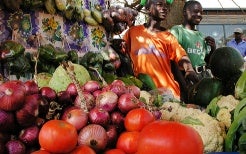 Let’s think together: Every Sunday the World Bank in Tanzania in collaboration with The Citizen wants to stimulate your thinking by sharing data from recent official surveys in Tanzania and ask you a few questions.
Let’s think together: Every Sunday the World Bank in Tanzania in collaboration with The Citizen wants to stimulate your thinking by sharing data from recent official surveys in Tanzania and ask you a few questions.
For many Tanzanians households, producing food for their family’s consumption remains their prime concern. About eight out of 10 Tanzanians are still involved in an agricultural activity, with only a marginal fraction of this production being commercialized. When Tanzanian households do something else, they generally earn just enough money to cover their food expenses. Other purchasing categories, such as housing and basic durable goods come a distant second, except for a few privileged households.
The importance of food for most Tanzanian households is highlighted by the following statistics:
- In 2007, food counted on average for 62 per cent of the household’s consumption basket in Tanzania, while it was only 51 per cent in Ghana, 35 per cent in Botswana, 20 per cent in Brazil, and 18 per cent in Japan.
- The budget share of food was inversely related to the household’s wealth, declining from 66 per cent for the poorest to 50 per cent for the wealthiest. It was also lower in urban centers (53 per cent) than in rural areas (65 per cent).
- The average share of food in total consumption declined marginally, from 69.5 per cent to 66.6 per cent, between 2001 and 2007, reflecting the small decline in the poverty level during this period.
Consequently, food matters a lot for most Tanzanians households. Fortunately, food is expected to be relatively cheap in Tanzania thanks to its abundant domestic agricultural production and relatively easy access to global markets. As of October 2012, the price of maize (one of the main items in the food basket) was 20 and 51 per cent lower in Tanzania than in Kenya and Uganda respectively. The price of rice was also lower by 52 and 26 per cent. But these comparisons do not hold with other developing countries such as Ethiopia (where the maize price was 10 per cent lower than in Tanzania) or Vietnam (where the price of rice was 42 per cent cheaper).
Perhaps the most intriguing element about food prices in Tanzania is that local consumer prices for maize and rice have increased by 39 per cent and 11 per cent respectively over the past 12 months, in sharp contrast with the trends observed in neighboring and world markets. Local and international prices have diverged significantly. Today, the price of one kilogram of rice is almost twice as high as in Vietnam, while both were approximately equal in mid-2008. At the current per capita level of income, the average Tanzanian is able to purchase approximately 500 kilograms of rice per year compared to over 2,000 kilograms in Vietnam.
All of this raises the following set of questions:
- Is food by far the most important consumption category for most households in Tanzania?
- According to the 2007 Household survey, an adult needs to consume the equivalent of Tsh20,000 per month to survive above the poverty level. At current prices, this could purchase approximately 10 kilograms of rice or 20 kilograms of maize. Are those quantities realistic?
- Why have food prices continued to increase in Tanzania when they have declined or grown much slower in neighboring and world markets over the past 12 months?
- If consumers are hurt by high food prices, producers may lose incentives with too low prices. What is the tradeoff and what should the Government do, if anything, about this?
- Should international food trade be promoted to reduce divergence between local and world food prices?
*Note: The statistics cited here are based on the national and international price statistics compiled by the World Bank and FAO (http://www.foodsecurityportal.org/api/), and the 2007 Household Survey. All are publicly available.




Join the Conversation